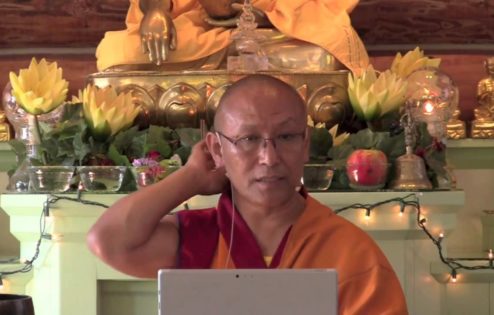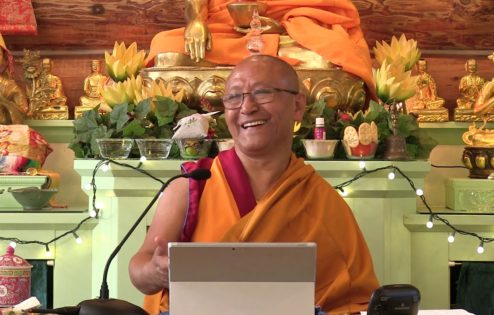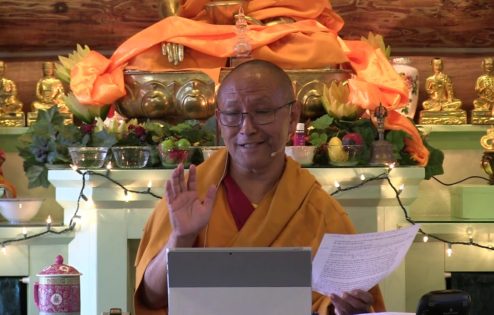Geshe Tenzin Chodrak (Dadul Namgyal)
Geshe Tenzin Chodrak (Dadul Namgyal) is a prominent scholar who earned a Geshe Lharampa degree in Buddhism and Philosophy from Drepung Monastic University in 1992. He also holds a Master’s degree in English Literature from Panjab University in Chandigarh, India. Author of several books on Buddhism, Geshe Tenzin Chodrak was also professor of Philosophy at Central Institute of Higher Tibetan Studies in Varanasi, India for seven years. In addition, he has been the Spiritual Director of Losel Shedrup Ling Tibetan Buddhist Center, Knoxville, USA. Due to his facility in both Tibetan and English, he is interpreter and speaker for numerous conferences exploring the interface of Buddhism with modern science, Western philosophy, and psychology and other religious traditions on both a national and international level. Geshela’s language ability has also enabled him to serve as an auxiliary language translator for His Holiness and Dalai Lama throughout the world. As a published author and translator, Geshela’s credits include a Tibetan translation of His Holiness the Dalai Lama’s Power of Compassion, a language manual, Learn English through Tibetan, and a critical work on Tsongkhapa’s Speech of Gold. Geshela lived and worked at Drepung Loseling Monastery in Atlanta, Georgia, where he prepared a six-year curriculum in Modern Science to be used in Tibetan monasteries and nunneries. Geshe Tenzin Chodrak is also on the Sravasti Abbey Advisory Board.
Featured Series

Madhyamaka through Metaphors with Geshe Tenzin Chodrak (Dadul Namgyal) (2015-17)
Teachings by Geshe Tenzin Chodrak (Damdul Namgyal) on Middle Way philosophy given at Sravasti Abbey.
View Series
Practicing the Six Perfections with Geshe Geshe Tenzin Chodrak (Damdul Namgyal) (2018)
Geshe Tenzin Chodrak (Damdul Namgyal) teaches on the six perfections of generosity, ethical conduct, fortitude, joyous effort, concentration, and wisdom at Sravasti Abbey.
View Series
Tenets with Geshe Tenzin Chodrak (Dadul Namgyal) (2020)
Teachings on Buddhist tenet systems by Geshe Tenzin Chodrak (Dadul Namgyal) given at Sravasti Abbey in 2020, with reviews by Venerables Thubten Chodron and Sangye Khadro.
View Series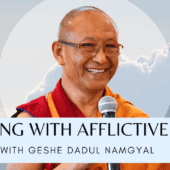
Working With Afflictive Minds with Geshe Tenzin Chodrak (Dadul Namgyal)
A series of weekend teachings on how to identify and overcome the afflictions given at Sravasti Abbey from June to August 2023.
View SeriesFeatured Posts

Why is bodhicitta so powerful?
How bodhicitta encapsulates numerous agents of transformation ...
View Post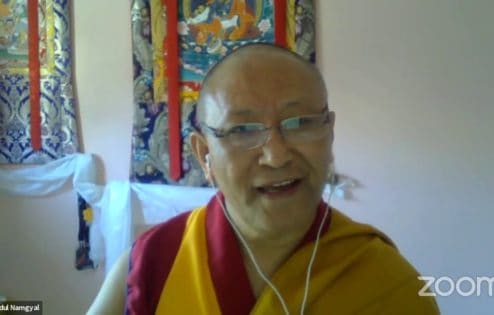
Buddhist tenet systems: What is the person?
The tenet system as a ladder of philosophical maturation. How ...
View PostView Posts
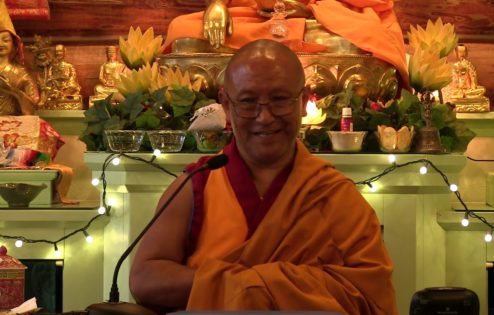
Day 3: Questions and answers
Discussion covering the two methods to generate bodhicitta, social engagement for monastics, mindfulness of mind,…
View Post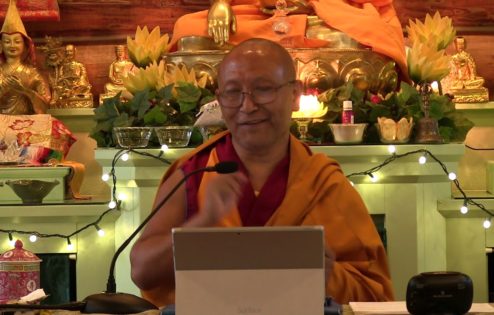
Diligence and concentration
Finishing the teaching on the perfection of diligence, and discussing factors for cultivating and stabilizing…
View Post
Fortitude and diligence
The fortitude of voluntarily enduring suffering, armor-like diligence, and unrelenting diligence.
View Post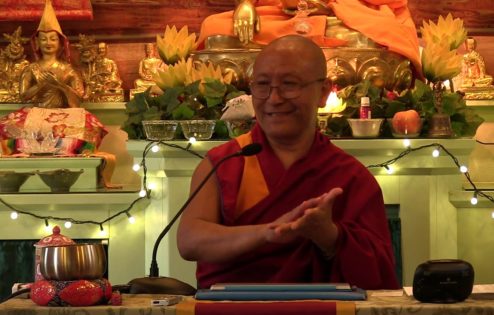
Day 2: Questions and answers
Discussion session covering near-death experiences from a Buddhist perspective, organ donation, and the importance of…
View Post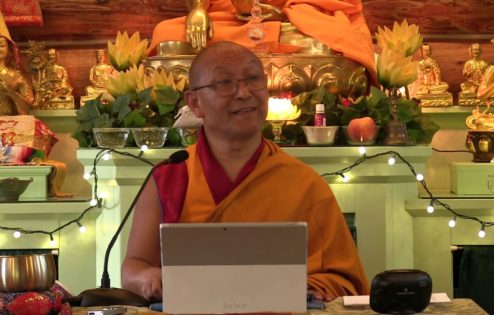
Developing equanimity
How to cultivate and develop equanimity, and the equalizing and exchanging self and others technique…
View Post
Cultivating positive states of mind
Methods to train the mind, focusing on the sequence of developing positive states of mind.…
View Post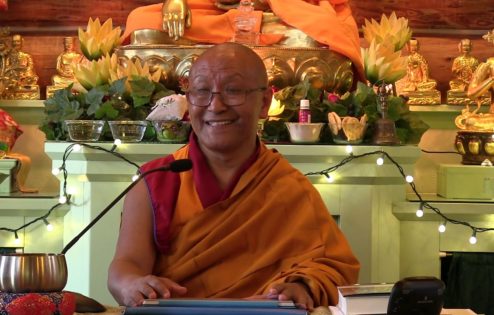
Day 1: Questions and answers
Session discussing signs of irreversible bodhicitta, the four maras, wishing all sentient beings to be…
View Post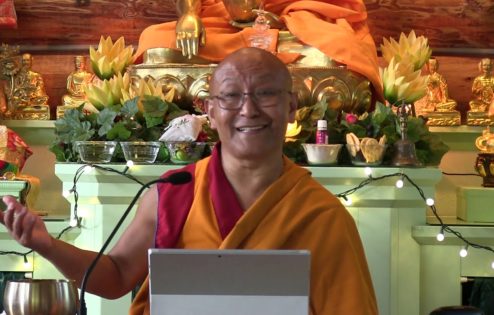
Bodhicitta, a vast perspective
Exploring reasons why bodhicitta is so powerful and teachings on the seven-step cause and effect…
View Post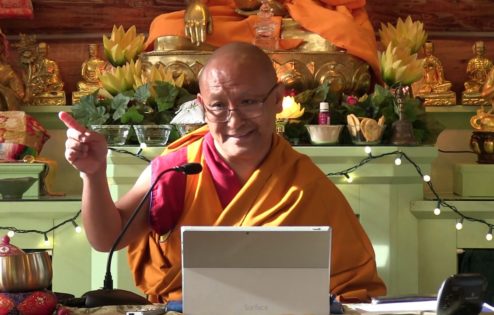
Review of bodhicitta
A review of bodhicitta, exploring praises of this jewel of minds, and why it is…
View Post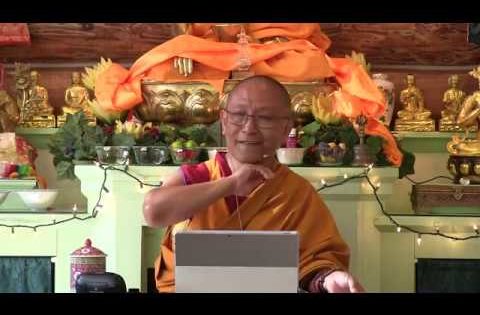
Paramita of fortitude
Examples from Buddhist scriptures of the bodhisattva perfection of fortitude.
View Post